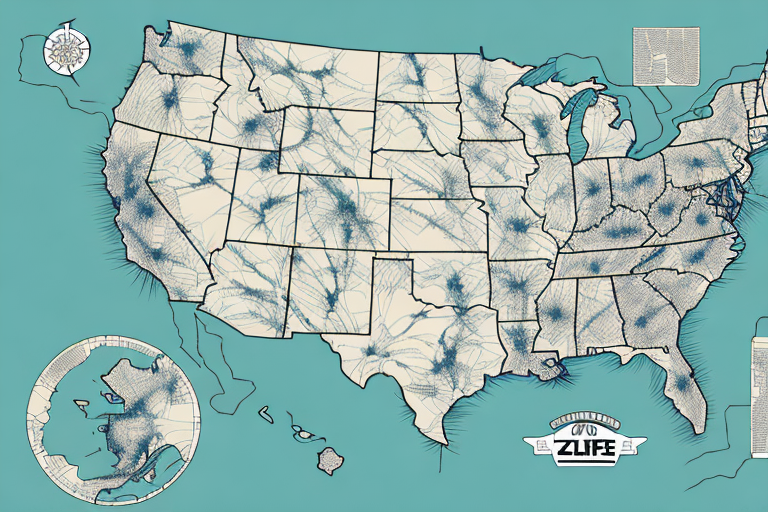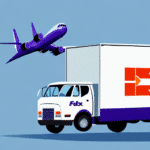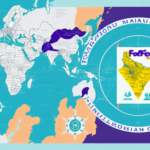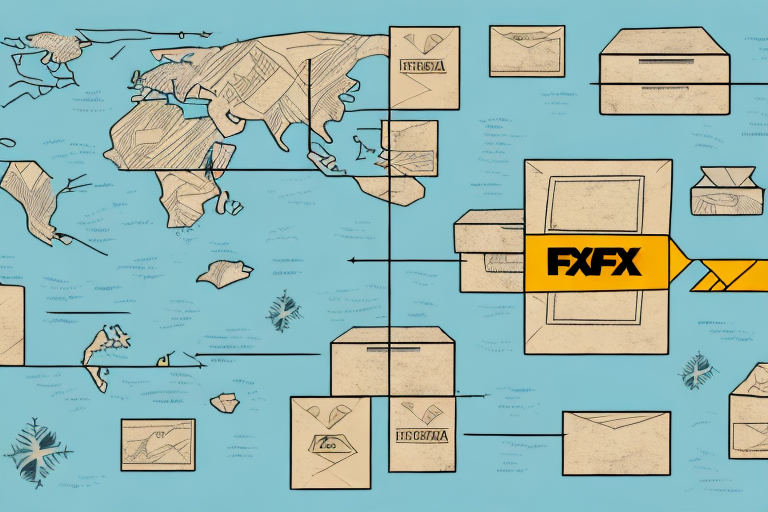Understanding UPS Ground Shipping Zones
If you are running a business that requires shipping goods, it is essential to understand the concept of shipping zones. By optimizing your shipping strategy and effectively utilizing UPS Ground Shipping Zones, you can save on shipping costs and minimize delivery times. This article provides an in-depth understanding of UPS Ground Shipping Zones, their importance, and strategies to utilize them effectively.
Definition and Importance
UPS Ground is a reliable and cost-effective shipping option offered by United Parcel Service (UPS) that provides delivery services to every state in the United States, including Alaska and Hawaii. UPS Ground Shipping Zones are geographical regions determined by destination ZIP codes that help in estimating delivery times and calculating shipping costs. Each shipping zone represents a distance range from the origin ZIP code, with higher zone numbers indicating greater distances and, consequently, higher shipping costs.
For example, shipping a package from New York City (ZIP code 10007) to Los Angeles (ZIP code 90002) falls under shipping Zone 8, which represents a maximum distance range.
It is important to note that UPS Ground Shipping Zones are not based on state lines. A single state may encompass multiple shipping zones depending on the distance from the origin, meaning shipping costs can vary even within the same state. To obtain accurate shipping costs and delivery time estimates, it is recommended to consult the UPS Ground Shipping Zone map or use the online shipping calculator.
Determining Your Shipping Zone
To accurately determine your package's shipping zone, you need the origin ZIP code, destination ZIP code, and information about the package's weight and dimensions. You can utilize UPS's shipping calculator or download the shipping zone chart from the UPS website.
Accurate determination of the shipping zone is crucial as it directly influences both the cost and delivery time of your shipment. Closer zones generally incur lower costs and facilitate faster deliveries, while more distant zones, like Zone 8, result in higher shipping fees and longer delivery times.
For international shipments, it's essential to identify the destination country's shipping zone. UPS provides a comprehensive list of international shipping zones and rates on their official website. Additionally, international shipments may be subject to customs fees and regulations, which should be considered when planning your shipping strategies.
Factors Affecting Shipping Timeframes
The primary factor affecting UPS Ground Shipping Zone timeframes is the distance between the origin and destination ZIP codes. The shipping zone number is directly proportional to the distance—packages sent to higher-numbered zones generally take longer to deliver. However, other factors also influence delivery times, including:
- Weather Conditions: Severe weather can delay transportation and delivery.
- Traffic Congestion: High traffic volumes can slow down delivery schedules.
- Customs Clearance: International shipments may experience delays due to customs processing.
- Holidays: Peak seasons and holidays can increase demand, potentially causing delays.
Additionally, the size and weight of the package can impact delivery times. Larger and heavier packages require more handling and may necessitate transportation via specialized vehicles, potentially extending delivery durations. The selected UPS service type—such as standard UPS Ground versus UPS Ground with Freight—can also affect delivery times due to differences in handling and shipping processes.
It's important to recognize that UPS Ground Shipping Zone timeframes are estimates rather than guaranteed delivery times. While UPS endeavors to adhere to these estimates, unforeseen circumstances, such as severe weather or operational delays, can impact actual delivery times. In such instances, UPS aims to deliver packages as promptly as possible and keeps recipients informed of any changes to the delivery schedule.
Calculating and Minimizing Shipping Costs
How Shipping Zones Influence Costs
Shipping costs for UPS Ground are determined by several factors, including the package's weight, dimensions, and the applicable shipping zone. UPS employs a tiered pricing system where heavier and larger packages incur higher shipping costs. Additionally, the shipping zone plays a significant role—the farther the destination ZIP code is from the origin, the higher the shipping zone, resulting in increased shipping fees.
For example, shipping a 10 lb package from California (Zone 5) may cost significantly less than shipping the same package from California to New York (Zone 8).
To estimate shipping costs based on these factors, use the UPS shipping calculator or refer to the UPS Ground shipping rate tables.
Tips for Reducing Shipping Expenses
- Optimize Package Size: Select appropriate packaging to avoid dimensional weight surcharges.
- Consolidate Shipments: Group orders based on shipping zones to minimize total shipping costs.
- Leverage Negotiated Rates: If eligible, use UPS's negotiated shipping rates to lower costs.
- Schedule Early Shipments: Ship packages ahead of peak seasons to avoid expedited shipping costs due to increased demand.
- Utilize UPS Pickup Services: Take advantage of UPS's pickup options to reduce transportation costs.
Furthermore, consider implementing a just-in-time inventory system to minimize the frequency of shipments, consolidating multiple orders into a single shipment to reduce overall shipping expenses.
Optimizing Your Shipping Strategy
Best Practices for Efficient Shipping
Optimizing your shipping strategy with UPS Ground Shipping Zones can lead to significant cost savings and improved delivery efficiency. Here are some best practices to consider:
- Group Orders by Shipping Zone: Organize orders by their shipping zones to streamline the shipping process and reduce costs.
- Choose the Right Packaging: Select packaging that fits the product to avoid excess space, reducing dimensional weight costs.
- Leverage UPS Tools: Utilize UPS’s shipping calculator and tracking systems to plan and monitor shipments effectively.
- Schedule Regular Shipments: Establish a consistent shipping schedule to manage workflow and maintain customer satisfaction.
- Monitor Shipping Performance: Regularly review shipping metrics to identify areas for improvement.
Avoiding Common Shipping Mistakes
Avoid the following common mistakes when utilizing UPS Ground Shipping Zones to ensure cost-effective and timely deliveries:
- Incorrect Packaging: Using inappropriate packaging can lead to higher shipping costs and damages.
- Failing to Group Shipments: Not grouping orders by zone can result in higher costs and inefficiencies.
- Ignoring Peak Seasons: Overlooking peak shipping seasons can cause delays and increased shipping expenses.
- Not Using Negotiated Rates: Missing out on negotiated rates can lead to higher shipping costs.
- Poor Labeling Practices: Improper labeling can cause delivery delays or lost packages.
- Neglecting to Track Shipments: Failing to monitor shipments can result in lost or delayed packages.
Impact of External Factors
COVID-19 Effects on UPS Ground Shipping Zones
The COVID-19 pandemic significantly impacted the shipping industry, including UPS Ground Shipping Zones. Increased demand for e-commerce deliveries, disruptions in supply chains, and health and safety protocols led to extended delivery times and increased shipping costs. According to a UPS report from 2022, delivery delays were observed primarily during peak pandemic periods, affecting businesses and customers alike.
While the situation has stabilized, businesses should remain vigilant and adaptable to ongoing global challenges, ensuring their shipping strategies account for potential disruptions and fluctuating costs.
Comparing UPS Ground Shipping Zones with Other Shipping Options
When selecting a shipping option, businesses must evaluate various factors, including delivery times, shipping costs, reliability, and service availability. Comparing UPS Ground Shipping Zones with other shipping services such as USPS and FedEx Ground can help determine the best fit for your business needs.
UPS Ground vs. USPS Ground
UPS Ground typically offers faster delivery times and more robust tracking capabilities compared to USPS Ground services. While USPS may offer lower rates for lighter packages, UPS Ground provides a more reliable and predictable delivery schedule, which is crucial for businesses prioritizing timely deliveries.
UPS Ground vs. FedEx Ground
FedEx Ground and UPS Ground offer similar services, including cost-effective shipping options for businesses. However, UPS often has a more extensive network, potentially resulting in more efficient deliveries. Additionally, UPS's shipping tools and customer service are frequently rated higher in customer satisfaction surveys.
Choosing the Right Shipping Option
Ultimately, the best shipping option depends on your business's specific needs. Consider factors such as package size and weight, desired delivery times, budget constraints, and customer service expectations when comparing UPS Ground with other shipping carriers.
Benefits for Small Businesses
Small businesses can significantly benefit from utilizing UPS Ground Shipping Zones. By optimizing shipping strategies based on shipping zones, small businesses can:
- Reduce Shipping Costs: Efficient use of shipping zones leads to lower shipping expenses.
- Minimize Delivery Times: Faster deliveries enhance customer satisfaction and repeat business.
- Improve Operational Efficiency: Streamlined shipping processes save time and resources.
- Enhance Customer Experience: Reliable and timely deliveries contribute to positive customer reviews and loyalty.
- Scale Business Operations: Cost-effective shipping allows small businesses to scale without excessive overheads.
Additionally, UPS offers tailored solutions and discounts for small businesses, further enhancing the value of using UPS Ground Shipping Zones. Leveraging these benefits can help small businesses compete effectively in the market and foster sustainable growth.
Frequently Asked Questions (FAQs)
Is it possible to change the destination ZIP code after the package has been shipped?
Yes, you can change the destination ZIP code after shipping by using UPS My Choice or by contacting UPS customer service. Note that additional fees may apply.
How can I track my package shipped with UPS Ground?
You can track your UPS Ground package using the tracking number provided at the time of shipment. Use the UPS tracking tool to monitor your package’s delivery status and estimate the delivery time.
What should I do if my package is delayed or lost?
If your package is delayed or lost, contact UPS customer service to file a claim and resolve the issue. UPS provides support and resources to help track and recover lost packages.
Does shipping within the same zone reduce costs?
Shipping within the same zone or to a nearby zone can reduce shipping costs due to shorter distances, leading to lower shipping fees and faster delivery times.
Can I combine multiple packages into a single shipment?
Yes, consolidating multiple packages into a single shipment can lead to cost savings and increased shipping efficiency. However, ensure that the combined weight and dimensions comply with UPS's shipping guidelines.
In conclusion, understanding UPS Ground Shipping Zones is essential for businesses that require shipping goods. By optimizing shipping strategies based on shipping zones, businesses can reduce shipping costs, minimize delivery times, and improve customer satisfaction. Utilizing UPS Ground Shipping Zones efficiently can significantly impact a business's profitability and success.




















